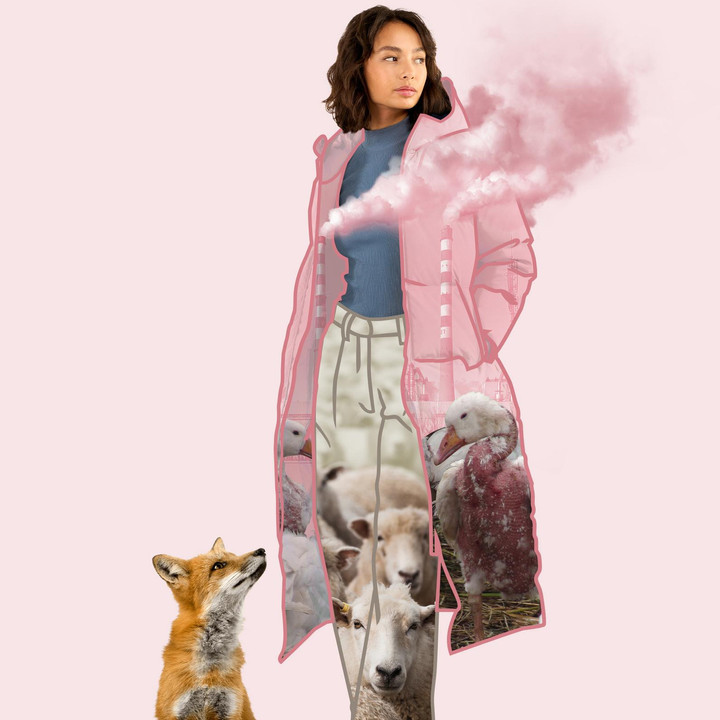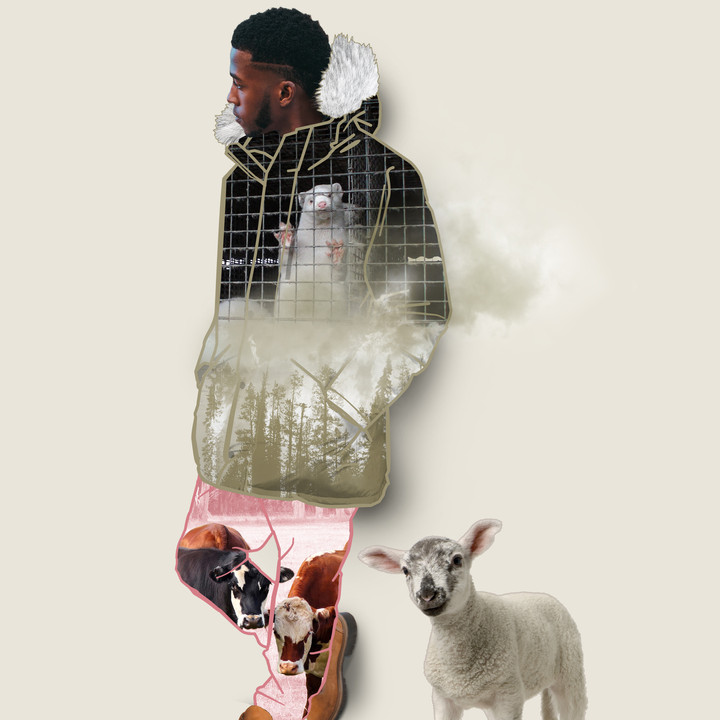
FOUR PAWS launches 'Taming Fashion'
A two-part report reveals fashion’s true cost for animals, humans and climate, and showcases new technology to create sustainable future-proof fashion.
18 July 2023 – New two-part report series Taming Fashion, from global animal welfare organisation FOUR PAWS, shows the shocking cost of the fashion industry’s use of animals. With over five billion animals used for fashion every year, the damage caused to animal welfare, the environment and to human workers is staggering.
While the impact is immense, change is possible as Taming Fashion highlights the innovation underway to produce future-forward animal-free and environmentally preferable next-gen materials. Over the past decade alone, the next-gen industry has received over $3 billion in investment.
The fashion industry is facing unprecedented criticism. Poor working conditions in low-income countries, major environmental issues, and severe violations against animal welfare have brought the industry’s shortcomings to the forefront.
A new report series Taming Fashion primarily dives deep into both the environmental impacts of animal agriculture and its use in fashion and the inherent animal welfare risks, and the boom in next-gen materials that may be the answer for a truly sustainable fashion industry.

What’s the issue with animal-derived materials (ADMs)?
Animal-derived materials (ADMs) such as wool, fur, leather and down are widely perceived as being “natural”, yet the production of these materials can release highly toxic chemicals into the environment and cause terrible impacts on the people charged with turning ADMs into useable fabrics.
The environmental impact of ADMs, including greenhouse gas emissions, in comparison to similar materials is often the worst.
At the core of this global issue are the five billion animals who suffer for fashion every year. Practices such as mulesing, live-plucking, and fur farming continue, while slaughter practices are brutal.
Despite these daunting facts, many brands remain unaware of the negative implications of using ADMs, while many others maintain the myth of ADMs being merely a by-product of the meat industry.
“Large-scale and factory farming is becoming increasingly prevalent, which not only has severe implications with regards to animal welfare but also accounts for one of the dominant drivers of the climate crisis. Animal agriculture is also the top driver of deforestation in the world’s tropical forests. Change is urgently needed,” says Medcalf.
Taming Fashion reveals that while fashion must drastically reduce production overall, material choice also matters. Thankfully “Next-Gen” and recycled materials are becoming more common place, but consumers are often unaware of what to look for.
Note: Any advertisements that may appear during the viewing of this video are unrelated to FOUR PAWS. We assume no liability for this content.
This report series aims to get brands and consumers to think beyond industry spin and choose a future where animals are not exploited, and fashion can become truly fashion-forward.
“While there’s much brands can and should do to help improve the conditions for animals used in their supply chains, ultimately, reducing use of animal-derived materials will have the most significant impact for animals, as well as bring huge benefits for biodiversity and our climate,” says Medcalf.
Next-Gen Materials
A YouGov poll, commissioned by FOUR PAWS in 2021, suggests that consumers are increasingly aware of the negative implications of ADMs (64%), while choices tend to lean towards more animal-friendly alternatives (13% increase in consumers seeking vegan fashion since the pandemic). Some brands such as Stella McCartney and Pangaia are already showcasing innovative textiles, e.g. bio-based faux fur or faux down made from fermented plant fibres.
“With over 100 next-gen material innovation companies now in existence, continuously developing, improving and evolving animal-free and environmentally preferrable next-gen materials, brands and consumers can choose kindness over carelessness.
“We can have a vibrant fashion sector, without the suffering, if creativity is equally put into ensuring truly ethical supply chains, where the use of animals is significantly reduced and replaced by recycled and next-gen materials. The time for a material transition is now.” says Medcalf.
What can shoppers do?
Consumers are encouraged to:
- Love pre-loved! Try the 80:20 rule. 80% pre-loved and 20% new and kind.
- Look for animal-free bio-based or recycled materials, like shoes made from mushrooms.
- Go for products made from waste, like discarded fishing nets and plant waste.
- Be a protector of oceans and rivers by washing less, spot cleaning more and using microfibre collection washing bags.
- Speak up. Tell your friends and let your favourite brands know that you want more animal-friendly fashion.
- Pledge to Wear it Kind and learn more here.
Let’s help create a kinder fashion industry and a make the world a place where animals, the environment and people are treated with respect, empathy and understanding.
For more information, read theTaming Fashion report, part one and part two and pledge to #WearItKind.
Background
The production of animal-derived materials goes hand in hand with global meat production, responsible for 16.5 per cent of greenhouse gas emissions, due to being taken from livestock who emit large quantities of methane during digestion.
Fur farming is inherently cruel, with wild animals being crammed into little cages. No fur animal welfare certification initiative can provide animals on fur farms with a life worth living.
Sheep in wool supply chains are regularly subjected to mutilations such as mulesing and castration without adequate pain relief as well as to stressful shearing practices, and long-distant transport.
Geese and ducks continue to be at risk of live-plucking and force-feeding in down supply chains. Many also suffer for extended periods during poorly managed slaughter systems.
Next-gen materials tend to have a lower environmental impact and an almost non-existent animal welfare risk as these materials effectively de-couple animal suffering and fashion.
Today, well over 100 leading brands are creating with next-gen materials, including Adidas which made boxing gloves from Desserto®, ‘cactus leather’, Hermes making bags out of MycoWorks Mycelium, Hugo Boss made a shoe design which included Piñatex®, as well as Gucci, H&M, Reformation, Stella McCartney and UGG, just to name a few.
Key next-gen alternatives to ADMs currently in market include:
- Faux Fur: Plant-based ingredients and microbe fermentation processes, or recycled PET
- Faux Wool: Made from blends, such as the fibre of Calotropis Gigantea bush mixed with cotton, or manufactured through fermentation of plant-based ingredients by specially designed microbes which produce polymers that can be spun into yarn
- Faux Down: Made from Kapok seed fibre, or blends made with wildflowers or recycled insulative fabrics
MIOMOJO Srl SB is a Benefit Company and a certified B Corp based in Bergamo, Italy. Founded in 2012 by Claudia Pievani, it designs and produces cruelty-free fashion accessories with the aim of not harming animals, humans, or our beautiful planet. MIOMOJO kindly donated their time and resources to help create a flyer, featuring next-gen, animal-free and environmentally preferrable materials, to showcase these as well as help to promote interest in the findings of FOUR PAWS Taming Fashion report series.

Elise Burgess
Head of CommunicationsM: 0423 873 382
FOUR PAWS Australia
GPO Box 2845
SYDNEY NSW 2001
Main Phone: 1800 454 228
Follow us on social media
Stay up to date on this topic and on all FOUR PAWS activities on our social media channels:
About FOUR PAWS
FOUR PAWS is the global animal welfare organisation for animals under direct human influence, which reveals suffering, rescues animals in need and protects them.
Founded in 1988 in Vienna by Heli Dungler and friends, the organisation advocates for a world where humans treat animals with respect, empathy and understanding. The sustainable campaigns and projects of FOUR PAWS focus on companion animals including stray dogs and cats, animals in fashion, farm animals, and wild animals – such as bears, big cats, and orangutans – kept in inappropriate conditions as well as in disaster and conflict zones.
With offices in Australia, Austria, Belgium, Bulgaria, France, Germany, Kosovo, the Netherlands, Switzerland, South Africa, Thailand, Ukraine, the UK, the USA, and Vietnam as well as sanctuaries for rescued animals in eleven countries, FOUR PAWS provides rapid help and long-term solutions. www.four-paws.org.au



